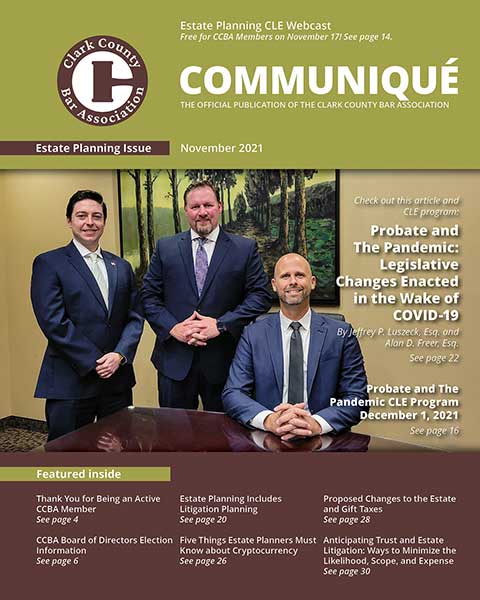Currently, an individual can transfer up to $11.7 million (or $23.4 million for a married couple) without incurring a federal gift, estate, or generation-skipping transfer tax. These exemption amounts were set by the Tax Cuts and Jobs Act of 2017. The Act set the exemption amount at $10 million (adjusted for inflation each year) per individual and is set to expire on December 31, 2025. However, due to the current political representation of the U.S. Congress, there are several proposed bills this year to reduce the exemption amount and the number of estate planning techniques to minimize an individual’s taxable estate.
Beginning with the “For the 99.5 Percent Act” introduced by U.S. Senators Bernie Sanders and Sheldon Whitehouse on March 25, 2021, this bill proposed to reduce the estate tax exemption to $3.5 million, reduce the lifetime gift tax exemption to $1 million, increase the estate tax on a progressive rate from 45 percent to 65 percent, minimize discount planning, and make Grantor Retained Annuity Trusts (GRATS), Intentionally Defective Grantor Trusts (IDGTs), Generation Skipping Tax (GST) Trusts, and Dynasty Trusts less attractive. If passed, the proposed changes would take effect after the date of enactment.
Shortly thereafter, the Sensible Taxation and Equity Promotion (STEP) Act, was introduced by U.S. Senators Chris Van Hollen, Cory Booker, Bernie Sanders, Sheldon Whitehouse, and Elizabeth Warren on March 29, 2021. Its purpose is to close the stepped-up basis loophole by taxing unrealized capital gains when beneficiaries inherit assets which the original owner never paid income taxes on. Under the STEP Act, gifts and bequests of appreciated property would be treated as sales such that unrealized capital gain would be taxable to the donor at the time of the transfer. To ensure this change applies only to wealthy families, this bill exempts the first $1 million of capital gain at death and $100,000 of capital gain can be excluded during lifetime, but amounts used during lifetime reduce the exclusion available at death. Transfers of appreciated assets to spouses and charities would also be excluded. The STEP Act proposed a retroactive application so that it is effective as to any gifts or inheritances after December 31, 2020.
In September 2021, the House Ways and Means Committee released a proposal to fund the Build Back Better Act. The proposal reduces the gift and estate tax exemption to $5 million per individual (as indexed for inflation). It is anticipated that the inflation indexed amount would be approximately $6 million per individual as of January 1, 2022. Under this proposal, taxpayers will no longer be able to take valuation discounts for gift and estate tax purposes on entities holding passive assets not used in an active trade or business. This change will only be effective as to transfers occurring after the enactment of the law. In addition, the proposed changes to the taxation of “grantor” trusts will severely limit the use of such trusts. A “grantor trust” is a trust that is disregarded for federal income tax purposes, meaning that the “grantor” of the trust pays all income tax on behalf of the trust during grantor’s lifetime. However, upon the grantor’s death, the grantor trust assets are not included in the grantor’s estate for federal estate tax purposes. Thus, such assets are not subject to federal estate tax upon the grantor’s death. This type of trust allows assets to appreciate income tax free for the beneficiaries. However, the proposed changes will include the assets owned by the grantor trust into the grantor’s taxable estate, and will eliminate the grantor’s ability to sell appreciated assets without paying a capital gains tax. Thus, the use of GRATs, qualified personal residence trusts (QPRTs), spousal lifetime access trusts (SLATs), and irrevocable life insurance trusts (ILITs) may become less desirable or even unavailable. Existing grantor trusts will be grandfathered in, and would be allowed to retain their tax benefits and the law would only apply to transfers into such trusts after the enactment of the law.
While none of the above proposals are law, there is great momentum for changes to the current estate, gift, and GST tax regime, and it is important to understand the proposed changes and to take appropriate action now.
About the author

Peter Co is an associate at the law firm of Goldsmith & Guymon, P.C. and practices in estate planning, probate/trust administration & litigation, business formation, and guardianship law.

About this article: This article was originally published in the “Estate Planning” issue of Communiqué, the official publication of the Clark County Bar Association, (November 2021). See https://clarkcountybar.org/about/member-benefits/communique-2021/communique-november-2021/.
© 2021 Clark County Bar Association (CCBA). All rights reserved. No reproduction of any portion of this issue is allowed without written permission from the publisher. Editorial policy available upon request.
